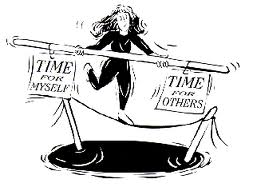 A few weeks ago, an acquaintance on Facebook posted the question (and I’m paraphrasing because my memory sucks lately and I can’t remember the exact wording but I promise you’ll get the point) “Is there a time version of living paycheck to paycheck? You know, when you run out of time and there’s no possible way to add more?”
A few weeks ago, an acquaintance on Facebook posted the question (and I’m paraphrasing because my memory sucks lately and I can’t remember the exact wording but I promise you’ll get the point) “Is there a time version of living paycheck to paycheck? You know, when you run out of time and there’s no possible way to add more?”
It struck me as an interesting question. Because really, it’s not that we run out of time. It’s just that we use our time poorly.
I know I’m guilty of that more often than I care to admit. Especially when it comes to finding time for myself and activities I enjoy.
And I’ve been trying to get better. It’s an exhausting feeling to spend every day running from place to place, eating in your car, attached to your iPhone, never feeling like you can truly relax. In fact, after I spend a few days like that, I start to have an anxiety attack which then means I can’t sleep which then means I’m forgetful and grumpy the next day. It’s a horrible way to live.
To prevent myself from feeling like that every single day, I’ve been using some strategies to control the amount of time I spend on things I have to do versus things I want to do (because there is a difference. And for me, when I’m spending my time on things I want to do, I don’t feel like I run out of time. It’s only when the obligations exceed the fun activities that I feel short on time).
Limit my daughter’s activities
This doesn’t just help control costs. This helps control time. One of the biggest complaints that I hear from my friends who are also parents is how tired they are of carting their kids around from activity to activity. It sucks up all of their “me” time and after a while, gets to be really bothersome. I don’t want to do that. So, I allow my daughter to participate in no more than 3 activities (one of them is completely free and she only goes when she feels like it since it’s ongoing) per week. And they have to be on different days. No running from one activity to another. She still needs time to do homework and be a kid. It works well for me because I’m not spending every afternoon and evening driving my exhausted, overworked, and stressed child around and I get to use that free time to do fun things with her like bake cookies or write stories.
Use a timer
There are tasks I don’t like to do. Folding laundry. Cleaning toilets. Emptying the dishwasher. But all of them need to get done. To prevent these necessary tasks from taking over my day, I employ the very common technique of using a timer. I’ll set the timer on my phone or the microwave and complete whatever I can in that amount of time. I’ve found that it works on several fronts: one, the tasks get done; two, I move a lot faster because I feel like I’m in a race; three, I know that when I’m done, I get to put them behind me and move on to something I enjoy. If I have a lot of tasks to accomplish, I’ll ask my family to help. We’ll each take a part of the house and get done whatever we can in the fixed amount of time we’ve established.
Say no
I love saying no. It’s very freeing. There are people I know who accept invitations to every event they are invited to. They seriously never say no. I think they feel that if they do say no, they’ll be looked down upon or people will be mad at them. I guess I’m weird because I don’t care about that shit. First of all, saying yes to every invitation can get expensive. And we don’t have that kind of money. Second, I don’t want to say yes to every invitation from every person because honestly? There are some people I just don’t like and I don’t want to spend more time with them than I have to. And, on top of all of this, by saying no, I don’t feel like my time is owned by someone else. I get to decide how I spend my time rather than someone else dictating it. This isn’t to say that I turn down every invitation. Quite the opposite. But now that I’m working on owning my time, I feel better about saying no to an event I really don’t want to attend.
Sneak in fun activities
Call me a bad mother if you want, but I don’t feel the need to watch every moment of my child’s swimming lesson or cheerleading practice. Yes, I do watch and yes, I do engage but there’s only so much you can do sitting on the sidelines. So, I bring a book to read. Or I spend a few minutes catching up on Words with Friends. Or I’ll peruse Facebook. Or write down blog post ideas. Stuff like that. Even though I’m stagnant, there’s no reason I can’t take a few minutes to do something enjoyable. And, if I need to, I’ll do some work from my phone (thank you, apps that make my life easier). These times, when my child is busy and I’m actively avoiding parents I can’t stand, are wonderful times to work on something for myself. Oh, yeah. And I’ll admit it. Sometimes I offer to run an errand and I’ll take a few extra minutes to browse and spend some time alone.
It’s not a perfect system at all. But these few steps ensure that I’m getting everything done that I need to, that I’m not overtaxed and that I still have some time left over to engage in activities I enjoy. I’ve always been pretty good at time management for obligations; these methods are helping me get better at time management for fun.
Readers, how do you manage your time so that you strike a balance between obligations and fun?



